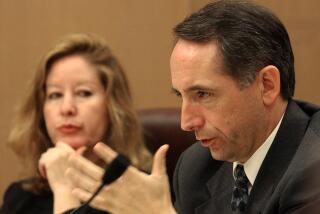Ruling Clears Quackenbush Whistle-Blower
- Share via
SACRAMENTO — In a decision that could give attorneys new freedom to expose wrongdoing, the State Bar of California has exonerated whistle-blower Cindy Ossias of violating lawyers’ ethics when she leaked documents that contributed to the downfall of former Insurance Commissioner Chuck Quackenbush.
The bar found that the actions of Ossias, a Department of Insurance lawyer, were not only protected by the California Whistleblower Act but, more important, “advanced . . . public policy considerations bearing on the responsibilities of the office of insurance commissioner.”
“We have concluded that Ms. Ossias did not engage in conduct which warrants disciplinary prosecution,” wrote Donald R. Steedman, the bar’s deputy trial counsel. The bar licenses and disciplines lawyers.
Legal experts said the carefully worded decision--believed to be the first of its kind in the nation--could be an important breakthrough, especially for government lawyers who witness wrongdoing that could affect the public.
In those instances, they said, the decision seemed to mean that the obligation to protect the public overrides other considerations, including a lawyer’s ethical obligation not to divulge confidential information provided by clients.
“I read this as a statement acknowledging that lawyers can ‘whistle blow’ in appropriate circumstances, [but] it’s not a license for everybody to go ratting on their clients,” said Richard Zitrin, who is director of the Center for Applied Legal Ethics at the University of San Francisco Law School and who represented Ossias without pay.
Clark Kelso, the McGeorge Law School professor who briefly served as acting insurance commissioner after Quackenbush was forced to resign, agreed that the decision would provide new protection for government lawyers but questioned whether it extended to all attorneys.
“It seems to me it applies only to the public sector,” he said. “I think if a disclosure by an attorney is protected by the Whistleblower Act and the disclosure advances important public policy, then you may not have a problem with the state bar.”
Zitrin, the author of several books, including “The Moral Compass of the American Lawyer,” acknowledged that the decision was less clear on that point. But he said it appeared applicable to any attorney whose disclosures could protect the public.
“I don’t know if Cindy was working for Firestone and blew the whistle to the Legislature on faulty tires . . . what would have happened,” he said, “but I would have hoped the state bar would have come to the same conclusion.”
Ossias provided information to the Assembly Insurance Committee about secret settlements Quackenbush had reached with six insurance companies after the Northridge earthquake. The settlements allowed the companies to donate money to private foundations that Quackenbush created rather than face possible fines for mishandling Northridge claims.
Funds from one of the foundations were used for political polling and television advertising designed to help the commissioner prepare to run for higher office, say court documents filed by state Atty. Gen. Bill Locyker. A series of legislative hearings prompted Quackenbush to resign, effective July 10.
Before he left office, Quackenbush placed Ossias on administrative leave and took steps to fire her.
His successor, Kelso, reinstated her, deciding after a thorough investigation that her actions were protected by the Whistleblower Act, which provides that state employees be free “to report waste, fraud, abuse of authority, violation of law, or threat to public health without fear of retribution.”
In an interview, Kelso said he was pleased by the bar’s position because “it would be odd if lawyers were to get the protection of the Whistleblower Act only to have the state bar take their license.”
Kelso said the bar’s decision could be far-reaching, because lawyers are “often going to be the ones who have the greatest insight” into wrongdoing.
Assemblyman Darrell Steinberg (D-Sacramento), who conducted much of the questioning during the Quackenbush hearings, said the decision sends the right message that, for the government lawyer, the real client is the “public, first and foremost.”
He said Ossias had been put in the difficult position of having to weigh her conscience and her public responsibility against the effect her actions to expose wrongdoing might have on her livelihood.
“The bottom line is this,” he said: “But for Cindy’s willingness to risk her job and her license, we probably would not have gotten to the bottom of this scandal.”
Steinberg, who is himself a lawyer, said he will introduce legislation to make it clear in law that the protections of the Whistleblower Act apply to attorneys.
“Cindy’s situation raised a very important issue: how we strike the right balance between maintaining the sanctity of attorney-client privilege and at the same time make sure lawyers have the ability to expose fraud and corruption,” he said.
Ossias, who for months had been under the threat of losing her ability to practice law, said she was “terribly relieved” by the decision.
“It’s validation for what I’ve done,” she said. “That’s the best thing.”
Insurance company officials, who have criticized Ossias for releasing confidential documents, declined to comment.
State bar lawyers would not discuss the origin of their investigation of Ossias. Zitrin said he understood that it had been initiated by the bar because the organization considered the facts surrounding her case to be of substantial public interest.
Zitrin, a frequent critic of what he considers the bar’s lax disciplinary policies, said he volunteered to represent Ossias without pay because “I was absolutely convinced she did the right thing.”
More to Read
Sign up for Essential California
The most important California stories and recommendations in your inbox every morning.
You may occasionally receive promotional content from the Los Angeles Times.













